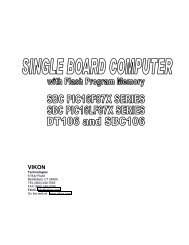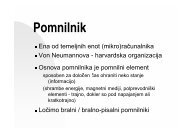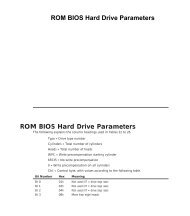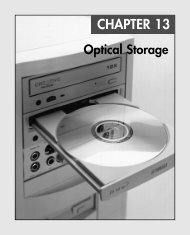upgrading and repairing PCs technicians ... - 400 Bad Request
upgrading and repairing PCs technicians ... - 400 Bad Request
upgrading and repairing PCs technicians ... - 400 Bad Request
You also want an ePaper? Increase the reach of your titles
YUMPU automatically turns print PDFs into web optimized ePapers that Google loves.
Network Protocols 275<br />
Network Protocols<br />
The second most important choice you must make when you create<br />
your network is which network protocol you will use. The network<br />
protocol affects with which types of computers your network<br />
can connect.<br />
The three major network protocols are TCP/IP, IPX/SPX, <strong>and</strong><br />
NetBEUI. Unlike data-link protocols, though, network protocols are<br />
not tied to particular hardware (NIC or cable) choices. Network<br />
protocols are software <strong>and</strong> can be installed or removed to any computer<br />
on the network at any time as necessary.<br />
Table 11.6 summarizes the differences between these protocols.<br />
Table 11.6 Overview of Network Protocols <strong>and</strong> Suites<br />
Included in<br />
Protocol Protocol Suite Best Used for Notes<br />
IP TCP/IP Internet <strong>and</strong> large Also used for dial-up Internet<br />
networks access; native protocol suite of<br />
Windows 2000, Windows Me, <strong>and</strong><br />
Novell NetWare 5.x<br />
IPX IPX/SPX Networks with Used by NetWare 5.x for certain<br />
Novell 4.x <strong>and</strong><br />
earlier servers<br />
special features only<br />
NetBEUI N/A Windows 9x, Me, Can’t be routed between networks;<br />
2000, or Windows simplest network protocol; also<br />
for Workgroups used with Direct Cable Connection<br />
peer networks NIC-less “networking”<br />
All the computers on any given network must use the same network<br />
protocol or protocol suite to communicate with each other.<br />
IP <strong>and</strong> TCP/IP<br />
IP st<strong>and</strong>s for Internet Protocol; it is the network layer of the collection<br />
of protocols (or protocol suite) developed for use on the<br />
Internet <strong>and</strong> commonly known as TCP/IP (Transmission Control<br />
Protocol/Internet Protocol).<br />
Later, the TCP/IP protocols were adopted by the UNIX operating<br />
systems, <strong>and</strong> they have now become the most commonly used protocol<br />
suite on PC LANs. Virtually every operating system with networking<br />
capabilities supports TCP/IP, <strong>and</strong> it is well on its way to<br />
displacing all the other competing protocols. Novell NetWare 5 <strong>and</strong><br />
Windows 2000 both use TCP/IP as their native protocol for most<br />
services.
















